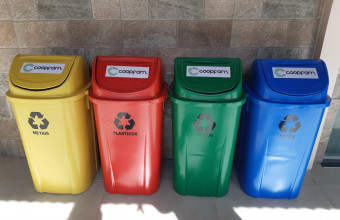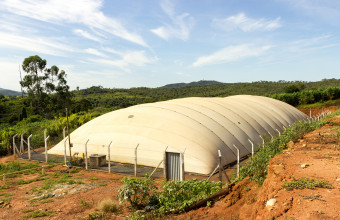Coopfam (Cooperativa dos Agricultores Familiares de Poço Fundo e Região), a cooperative of family farmers from the southeast of Brazil, was founded in 2003, originating from the Association of Small Producers of Poço Fundo, active since the early ’90s. Producing high-quality and certified coffee through sustainable agriculture is the distinctive feature of this cooperative, based in the state of Minas Gerais.
An example of this commitment is Coopfam’s waste management project, which integrates coffee farming into the circular economy, aiming to prevent waste and bring materials back into the production cycle. This initiative seeks to manage industrial waste from the cooperative’s roasting process with alternative and sustainable solutions, promoting the circular economy through reverse logistics.
According to Carlos Eduardo Garcia, environmental manager at Coopfam, the cooperative categorizes its waste into: organic, recyclable, electronic, mechanical, and domestic. “For this categorization, Coopfam has created an open space for the entire community called ‘Ecoponto’ and encourages the entire municipality to correctly separate waste, raising awareness through campaigns in schools and on social media”, said Garcia.
Valuable Waste
Organic waste generated in the roasting industry, such as husk, expired coffee, and discarded samples, is allocated to registered cooperative members who use them as agricultural input for the fertilization of their lands.
On the other hand, recyclable waste is separated and sent to the recycling plant in Poço Fundo. Coopfam has contributed to training collectors and improving the infrastructure of the plant.
Additionally, electronic waste is stored in collection boxes and sent to companies that reuse or properly dispose of these materials. “We are starting a partnership with a buyer of electronic waste, which will redirect resources for more environmental actions,” states Garcia.
Mechanical and domestic waste are also part of Coopfam’s sustainable practices, either through the sale to companies that repurpose these materials or through recycling.
Raising Awareness in the Community and Protecting the Environment
Coopfam also works to promote awareness among its members about proper waste sorting. The cooperative has environmental education initiatives and provides recycling kits to its associates. The sorted recyclables are allocated to six collection stations built by the cooperative in various rural neighborhoods.
“With this work, we managed to achieve some cost reductions, for example, in the negotiation of equipment or defective parts. We also manage our waste to avoid improper disposal, and raise awareness among our members and the community through campaigns, collection events, and locations where people can dispose of waste,” Garcia explains.
To prevent the improper disposal of polluting elements, the cooperative leads campaigns to collect pesticide containers in partnership with the Municipality of Poço Fundo. Other potential pollutants, such as batteries and light bulbs, are also collected and properly discarded.





